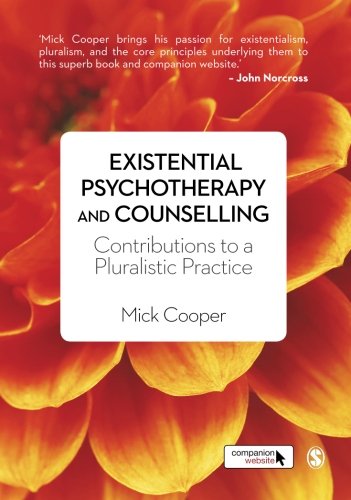The workshop is appropriate for training and practising counsellors, psychotherapists, counselling psychologists and other mental health professionals. Existential therapy is a diverse, vibrant, and wonderfully rich tapestry of understandings and methods that has the potential to make a valuable contribution to the work of any counsellor, psychotherapist or psychologist. It is one of the oldest forms of therapy, yet still one of the most innovative and radical. Existential therapy is orientated around the development of a deep relational bond with the client, which allows the client to explore the most fundamental aspects of their existence. This includes questions like: ‘What is the meaning of my life?’ ‘What choices can I make?’ and ‘How do I face the limits of my circumstances?’ This workshop introduces participants to the basic principles of existential philosophy and therapy, and looks at how practitioners of all orientations can integrate these ideas and practices into their own work.
A pre-recorded, online version of this workshop can be accessed here.
Learning outcomes
By the end of this workshop, participants will be able to:
Understand the core principles of existential philosophy
Understand the principal aims and forms of existential counselling and psychotherapy
Apply existential understanding of freedom and choice to their therapeutic practice
Apply existential understanding of limitations to their therapeutic practice
Apply existential understandings of meaning and purpose to their therapeutic practice
Schedule
Session 1: Introduction to existential philosophy and therapy
Session 2: Working with freedom and choice
Session 3: Facing the limitations of existence
Session 4: Helping clients find meaning and purpose in life
Format
This workshop is typically delivered as a one day event. However, a more extended version of this course can be delivered over two to five days.
The workshop combines self-development exercises, theoretical input, practical exercises, and small and large group discussion.
The workshop is appropriate for training and practising counsellors, psychotherapists, counselling psychologists and other mental health professionals.
Resources
A range of downloadable resources on existential therapy, from my 2015 book Existential Psychotherapy and Counselling, can be found by clicking here. This includes articles on existential therapy, group training exercises, and therapeutic tools
Existential therapy lecture slides (Translations: Ukrainian)
Books
Research publications
Correia, E. A., Sartóris, V., Fernandes, T., Cooper, M., Berdondini, L., Sousa, D., …da Fonseca, J. (2018). The practices of existential psychotherapists: development and application of an observational grid. British Journal of Guidance & Counselling, 46(2), 201-216. doi: 10.1080/03069885.2016.1254723
Correia, E., Cooper, M., & Berdondini, L. (2016). Existential therapy institutions worldwide: An update of data and the extensive list. Existential Analysis, 27(1), 155-200.
Correia, E., Cooper, M., & Berdondini, L. (2016). Worldwide list of existential psychotherapy institutions. Dasein, 5(Special issue), 83-131.
Craig, M., Vos, J., Cooper, M., & Correia, E. (2016). Existential psychotherapies. In D. Cain, K. Keenan & S. Rubin (Eds.), Humanistic psychotherapies (pp. 283-317). Washington: APA.
Vos, J., Cooper, M., Correia, E., & Craig, M. (2015). Existential therapies: A review of their scientific foundations and efficacy. Existential Analysis, 16(1), 49-69.
Vos, J., Cooper, M., Correia, E., & Craig, M. (2015). Existential therapies: A discussion and review of research methodologies and the evidence base to date. International Journal of Psychotherapy, 19(1), 47-57.
Willig, C., Berguno, G., Cooper, M., Milton, M., du Plock, S., & Spinelli, E. (2015). The challenge to theory in existential psychotherapy. Existential Analysis, 26(2), 225-236.
Correia, E., Cooper, M., & Berdondini, L. (2014). Existential Psychotherapy: An international Survey of the Key Authors and Texts Influencing Practice. Journal of Contemporary Psychotherapy. doi: 10.1007/s10879-014-9275.
Correia, E., Correia, K., Cooper, M., & Berdondini, L. (2014). Psicoterapia existencial latinoamericana en la actualidad. Revista Latinoamericana de Psicología Existencial, 9, 26-37.
Videos
The following video, presenting an introduction to existential psychotherapy at The Weekend University in 2018, gives an account of the underlying philosophical principles of existentialism, and three key implications for practice: working with freedom, limitations, and meaning. The video is just under 90 minutes long, but should provide a valuable introduction to thought and practice in the field.
Mick Cooper in conversation with Pete Sanders about existentially-informed person-centred therapy (2012).
Interview in 2011 with The Counselling Channel's Niall O'Loingsigh about the existential approach to counselling
Ukrainian: Introduction to Existential Therapy Lecture (translation by Olha Shevchuk)
Podcasts
Meaning and Existential Therapy with Eugene Leventhal



